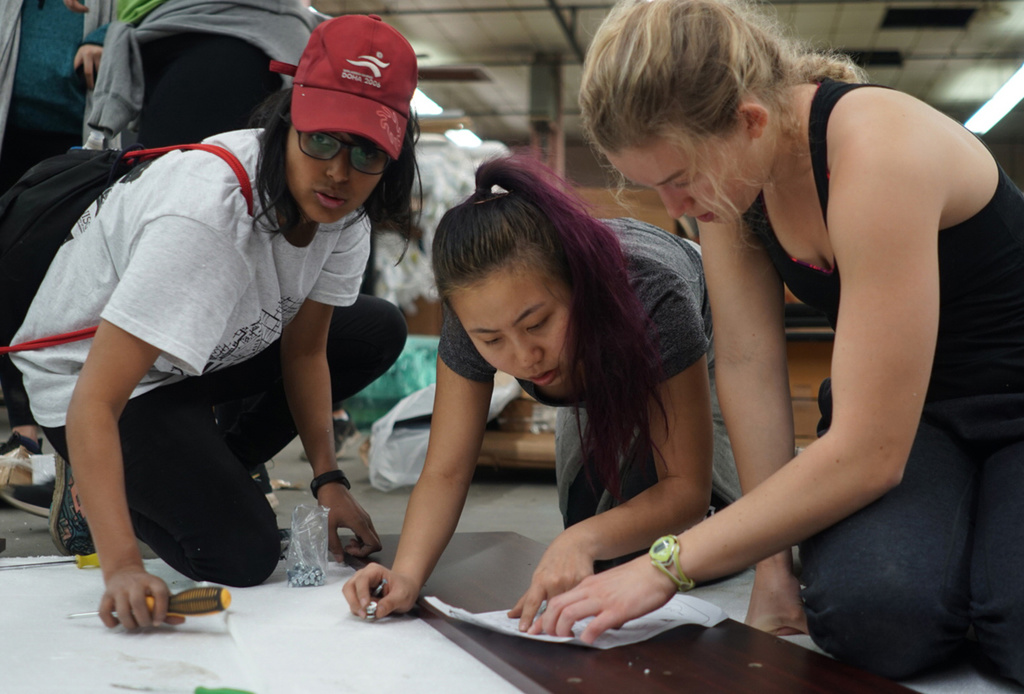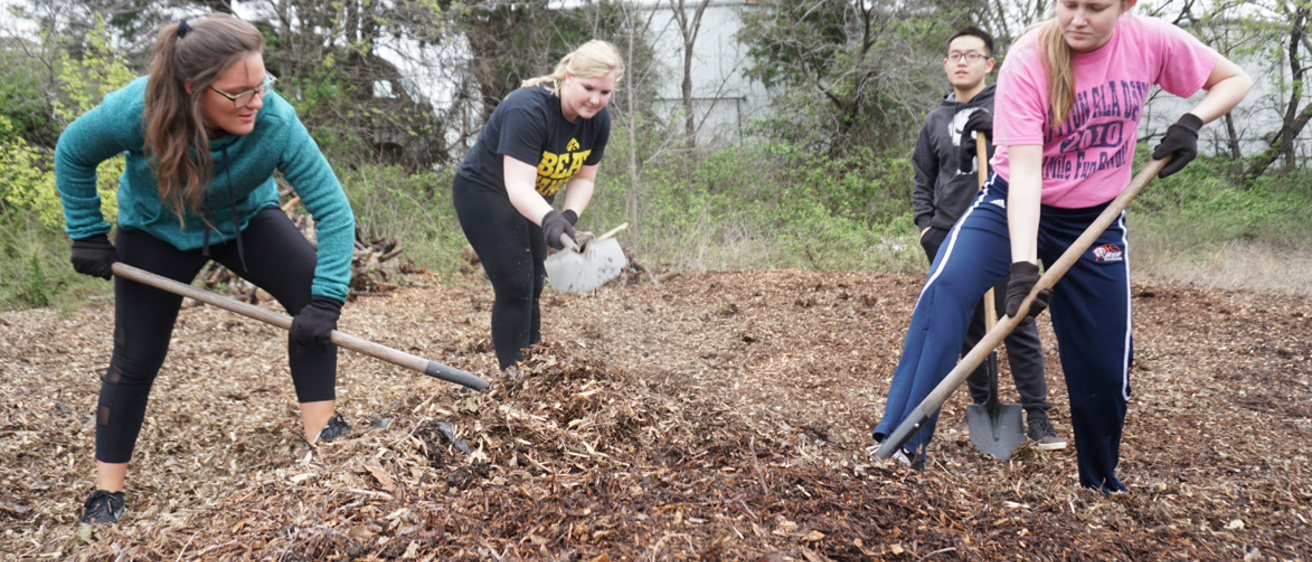Packing lunches at a homeless shelter in Milwaukee, shoveling mulch at a community garden in Denver, boxing up medical supplies in Atlanta to be sent overseas to communities in need, cooking breakfast for clients at an HIV/AIDS service organization in Dallas.
Where did participants go?
Hawkeye Service Teams visited the following communities over spring break: Atlanta; Biloxi, Mississippi; Buffalo, New York; Dallas; Denver; Detroit; Indianapolis; Kansas City; Memphis; Milwaukee; St. Louis; and Washington, D.C.
Use #IowaASB17 to see posts about the 2017 program on social media.
All of the above tasks were performed over spring break by University of Iowa students participating in one of 12 Hawkeye Service Teams. Commonly referred to as “alternative spring break,” the UI program promotes service learning, social justice, and community building. Students enroll in a for-credit spring semester course and travel to a community where they work with a variety of local organizations on projects that need attention—and some elbow grease.
Participation in the program has grown dramatically since it began in 2013, when one team of 16 students traveled to Memphis. In 2017, nearly 200 students on 12 teams were dispatched to locations across the country. Selection for the program—more than 350 students applied—is competitive, says Charlotte Brown, coordinator for leadership and service programs in the UI’s Center for Student Involvement and Leadership.
“The program gives students the opportunity to live out the mission of this institution and fulfill the expectations of the IOWA Challenge, and it offers them a hands-on learning experience where they can see and do something much larger than themselves,” Brown says. “I think we’re seeing growth because students are sharing their positive experiences with others and encouraging more participation.”

Each team has a theme: public health, youth education, urban development, homelessness, and economic disparity, to name a few. Before the trip, students meet once a week in a large lecture that covers broad social topics and then break down into their assigned teams to learn more about the communities they will be visiting. Once on location—they typically leave in a UI vehicle on the Saturday before spring break and return on the following Thursday—they spend from six to eight hours a day performing a variety of service work. Lodging varies by location, but often involves churches, hostels, and community centers.
Cultural events also are part of the visits. For example, those in Dallas this year got a behind-the-scenes tour of AT&T Stadium, home to the Dallas Cowboys, and Memphis travelers enjoyed barbecue and visited the legendary Sun Studio. Meanwhile, students in Atlanta visited CNN, and those in Washington, D.C., checked out the new National Museum of African American History and Culture.
“These outings help give the students a broader sense of what that community is all about,” says Brown.
Interested in joining a Hawkeye Service Team?
Applications for 2018 will be available in the fall 2017 semester. A $175 course fee covers most expenses, including transportation, housing, and most meals. Learn more...
Ben Ross, a fourth-year student from Rockford, Illinois, studying voice performance and music education, visited Detroit as part of a Hawkeye Service Team in 2016.
“I had been there before and had seen the intense social inequities. I was curious about why that was, so I went there for alternative spring break,” he says. “We worked with food banks, homeless shelters, educational nonprofits, and more. It provided an extremely holistic picture of the wide variety of issues that any community faces, but especially Detroit.”
The experience was so compelling that Ross returned to the program this year as a student leader, taking a group of 14 students to Denver to focus on homelessness. They worked with the Denver Rescue Mission, the Food Bank of the Rockies, and Habitat for Humanity ReStore.
“Homelessness is not necessarily what comes to mind when you think about Denver, since it’s a fairly affluent community, but it actually has an extremely large homeless population. It has a relatively temperate climate and offers a lot of social services,” he says. “I researched organizations to work with and planned activities that would allow us to think more about the systemic nature of homelessness and the wide variety of people who experience it.”
Ross, who plans to be a teacher, says the best part for him was the students.
“We worked directly on the social problems we discussed in class before we went to Denver, and then every night while we were there, I lead them through discussions and reflections of the day’s work, getting them to connect the work to their own experiences,” he says. “We talked about privilege, oppression, and prejudice, and I saw growth in all the students over the week. It was pretty amazing for me.”
After having what she describes as a life-changing experience in 2015 as part of a Hawkeye Service Team in Atlanta (“I became an adult on that trip—it was the first time I had traveled on my own—and I learned so much about social issues,” she recalls), junior Christina Behrens returned to the program this spring to lead a group of 14 looking at public health in Dallas. The team worked on an urban farm that helps provide fresh produce in needy areas and visited a Mexican consulate where they learned about health care services for immigrants.
One of the most humbling and eye-opening assignments for her team was a neighborhood cleanup on the city’s west side.
“It was so much more than picking up trash,” explains Behrens, a psychology major from West Des Moines. “What we found in the streets was alarming: syringes, batteries, condoms. Things you wouldn’t normally expect to see in a street. Seeing the condition of the homes in the area, some with roofs caving in, others with gaps in the doors the size of footballs, and knowing it was going to be near freezing that night was so disheartening. All those houses need to be torn down, but the tenants can’t afford other places to live and the city isn’t doing anything about it. We saw kids in the area too. You realize all the hazards they face living in such poor-quality homes.”
The disparities Behrens witnessed, both in Atlanta and in Dallas, have affected her career ambitions. She was a pre-med student her first year at Iowa, but now she’s looking at the field of public health.
“Seeing firsthand the barriers to good health that some people face, I thought, ‘I can help one person at a time as a doctor, or I can help a whole community by working to improve public health,’” she says.
Both students say they will continue service work in their communities.
“Having these experiences has been so beneficial to me,” says Behrens, who now plans weekend service trips for the coed service fraternity Alpha Phi Omega. “It’s made me want to be more involved in my own community.”
